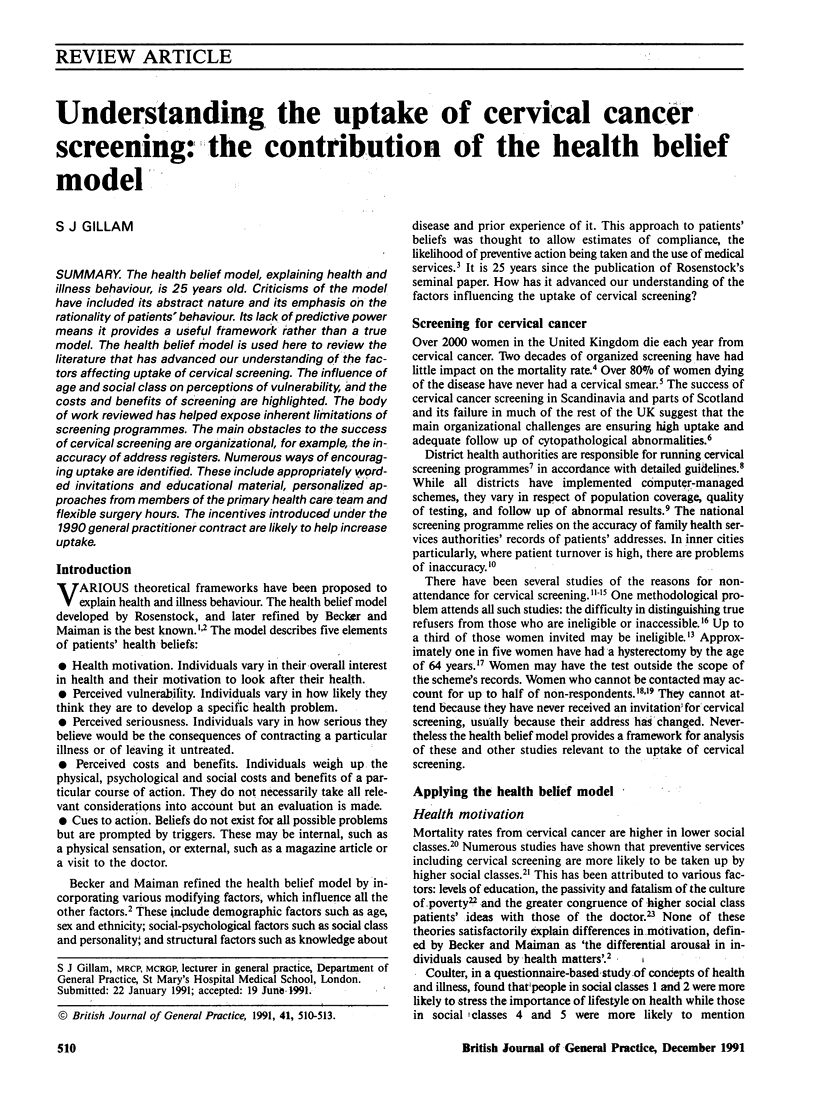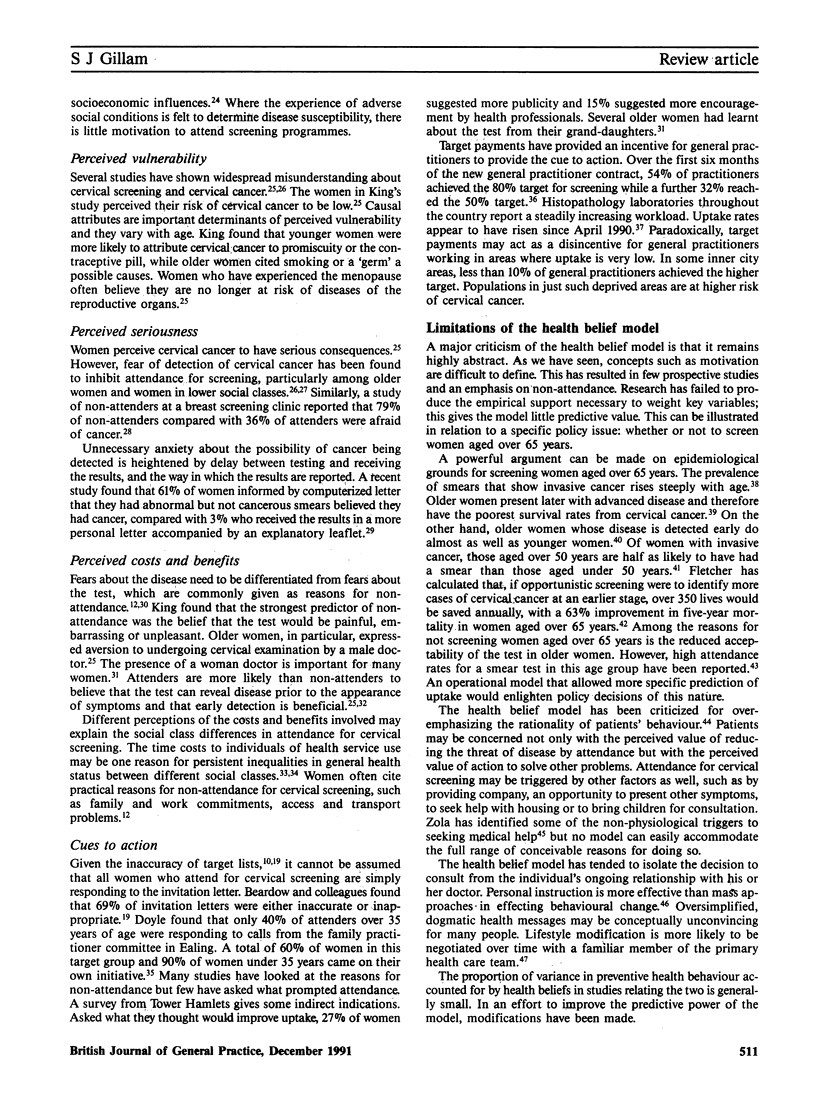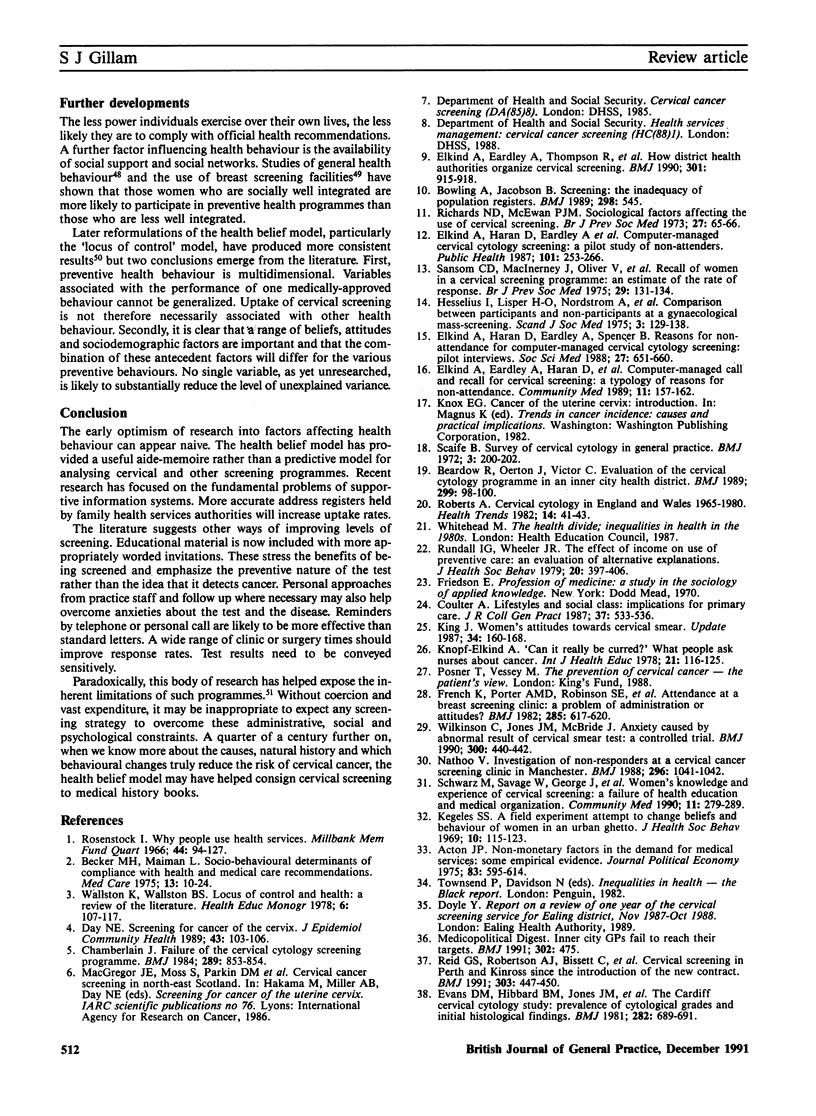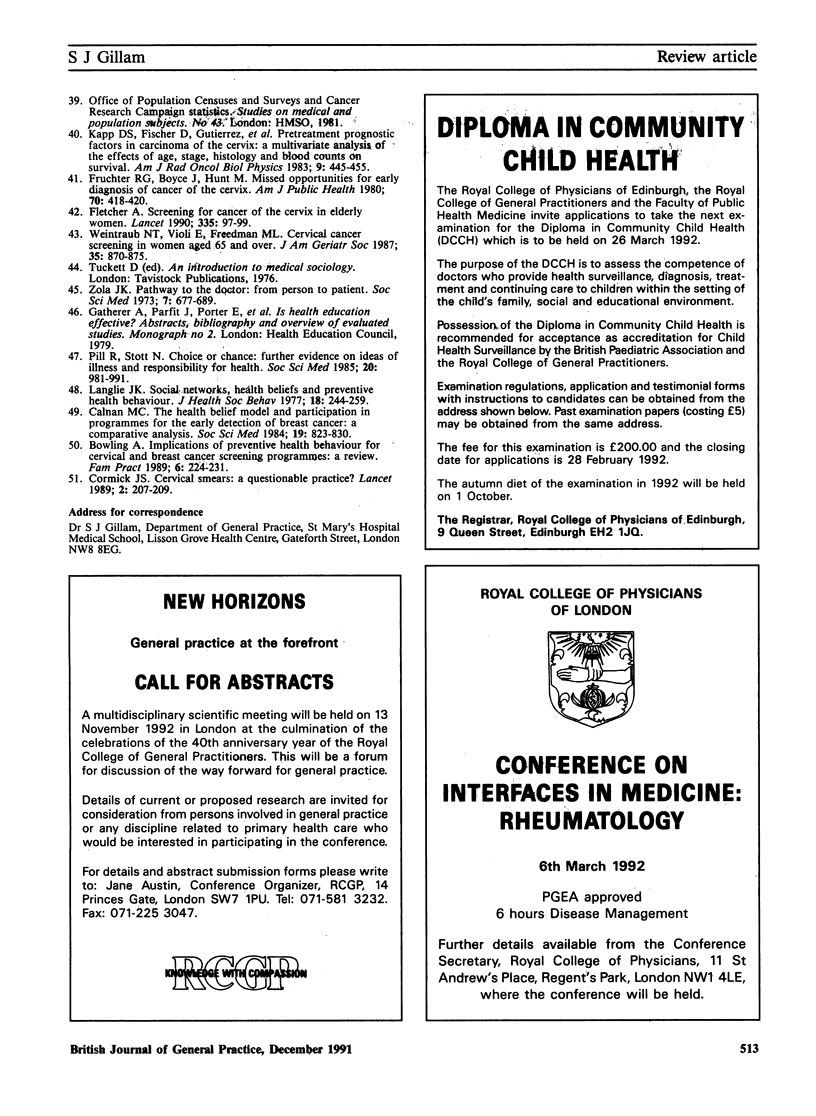Abstract
The health belief model, explaining health and illness behaviour, is 25 years old. Criticisms of the model have included its abstract nature and its emphasis on the rationality of patients' behaviour. Its lack of predictive power means it provides a useful framework rather than a true model. The health belief model is used here to review the literature that has advanced our understanding of the factors affecting uptake of cervical screening. The influence of age and social class on perceptions of vulnerability, and the costs and benefits of screening are highlighted. The body of work reviewed has helped expose inherent limitations of screening programmes. The main obstacles to the success of cervical screening are organizational, for example, the inaccuracy of address registers. Numerous ways of encouraging uptake are identified. These include appropriately worded invitations and educational material, personalized approaches from members of the primary health care team and flexible surgery hours. The incentives introduced under the 1990 general practitioner contract are likely to help increase uptake.
Full text
PDF



Selected References
These references are in PubMed. This may not be the complete list of references from this article.
- Beardow R., Oerton J., Victor C. Evaluation of the cervical cytology screening programme in an inner city health district. BMJ. 1989 Jul 8;299(6691):98–100. doi: 10.1136/bmj.299.6691.98. [DOI] [PMC free article] [PubMed] [Google Scholar]
- Becker M. H., Maiman L. A. Sociobehavioral determinants of compliance with health and medical care recommendations. Med Care. 1975 Jan;13(1):10–24. doi: 10.1097/00005650-197501000-00002. [DOI] [PubMed] [Google Scholar]
- Bowling A. Implications of preventive health behaviour for cervical and breast cancer screening programmes: a review. Fam Pract. 1989 Sep;6(3):224–231. doi: 10.1093/fampra/6.3.224. [DOI] [PubMed] [Google Scholar]
- Bowling A., Jacobson B. Screening: the inadequacy of population registers. BMJ. 1989 Mar 4;298(6673):545–546. doi: 10.1136/bmj.298.6673.545. [DOI] [PMC free article] [PubMed] [Google Scholar]
- Calnan M. The health belief model and participation in programmes for the early detection of breast cancer: a comparative analysis. Soc Sci Med. 1984;19(8):823–830. doi: 10.1016/0277-9536(84)90399-x. [DOI] [PubMed] [Google Scholar]
- Chamberlain J. Failures of the cervical cytology screening programme. Br Med J (Clin Res Ed) 1984 Oct 6;289(6449):853–854. doi: 10.1136/bmj.289.6449.853. [DOI] [PMC free article] [PubMed] [Google Scholar]
- Coulter A. Lifestyles and social class: implications for primary care. J R Coll Gen Pract. 1987 Dec;37(305):533–536. [PMC free article] [PubMed] [Google Scholar]
- Day N. E. Screening for cancer of the cervix. J Epidemiol Community Health. 1989 Jun;43(2):103–106. doi: 10.1136/jech.43.2.103. [DOI] [PMC free article] [PubMed] [Google Scholar]
- Elkind A. K., Haran D., Eardley A., Spencer B. Computer-managed cervical cytology screening: a pilot study of non-attenders. Public Health. 1987 Jul;101(4):253–266. doi: 10.1016/s0033-3506(87)80076-8. [DOI] [PubMed] [Google Scholar]
- Elkind A. K., Haran D., Eardley A., Spencer B. Reasons for non-attendance for computer-managed cervical screening: pilot interviews. Soc Sci Med. 1988;27(6):651–660. doi: 10.1016/0277-9536(88)90014-7. [DOI] [PubMed] [Google Scholar]
- Elkind A., Eardley A., Haran D., Spencer B., Smith A. Computer-managed call and recall for cervical screening: a typology of reasons for non-attendance. Community Med. 1989 May;11(2):157–162. doi: 10.1093/oxfordjournals.pubmed.a042460. [DOI] [PubMed] [Google Scholar]
- Elkind A., Eardley A., Thompson R., Smith A. How district health authorities organise cervical screening. BMJ. 1990 Oct 20;301(6757):915–918. doi: 10.1136/bmj.301.6757.915. [DOI] [PMC free article] [PubMed] [Google Scholar]
- Evans D. M., Hibbard B. M., Jones J. M., Sweetnam P. The Cardiff Cervical Cytology Study: prevalence of cytological grades and initial histological findings. Br Med J (Clin Res Ed) 1981 Feb 28;282(6265):689–691. doi: 10.1136/bmj.282.6265.689. [DOI] [PMC free article] [PubMed] [Google Scholar]
- Fletcher A. Screening for cancer of the cervix in elderly women. Lancet. 1990 Jan 13;335(8681):97–99. doi: 10.1016/0140-6736(90)90552-g. [DOI] [PubMed] [Google Scholar]
- French K., Porter A. M., Robinson S. E., McCallum F. M., Howie J. G., Roberts M. M. Attendance at a breast screening clinic: a problem of administration or attitudes. 1982 Aug 28-Sep 4Br Med J (Clin Res Ed) 285(6342):617–620. doi: 10.1136/bmj.285.6342.617. [DOI] [PMC free article] [PubMed] [Google Scholar]
- Fruchter R. G., Boyce J., Hunt M. Missed opportunities for early diagnosis of cancer of the cervix. Am J Public Health. 1980 Apr;70(4):418–420. doi: 10.2105/ajph.70.4.418. [DOI] [PMC free article] [PubMed] [Google Scholar]
- Hesselius I., Lisper H. O., Nordström A., Anshelm-Olson B., Odlund B. Comparison between participants and non-participants at a gynaecological mass screening. Scand J Soc Med. 1975;3(3):129–138. doi: 10.1177/140349487500300304. [DOI] [PubMed] [Google Scholar]
- Kapp D. S., Fischer D., Gutierrez E., Kohorn E. I., Schwartz P. E. Pretreatment prognostic factors in carcinoma of the uterine cervix: a multivariable analysis of the effect of age, stage, histology and blood counts on survival. Int J Radiat Oncol Biol Phys. 1983 Apr;9(4):445–455. doi: 10.1016/0360-3016(83)90060-3. [DOI] [PubMed] [Google Scholar]
- Kegeles S. S. A field experimental attempt to change beliefs and behavior of women in an urban ghetto. J Health Soc Behav. 1969 Jun;10(2):115–124. [PubMed] [Google Scholar]
- Khassis U., Tillman I. Integration of the health education component in the opening of a new regional hospital in Jerusalem. Int J Health Educ. 1978;21(2):116–119. [PubMed] [Google Scholar]
- Langlie J. K. Social networks, health beliefs, and preventive health behavior. J Health Soc Behav. 1977 Sep;18(3):244–260. [PubMed] [Google Scholar]
- McCormick J. S. Cervical smears: a questionable practice? Lancet. 1989 Jul 22;2(8656):207–209. doi: 10.1016/s0140-6736(89)90384-x. [DOI] [PubMed] [Google Scholar]
- Nathoo V. Investigation of non-responders at a cervical cancer screening clinic in Manchester. Br Med J (Clin Res Ed) 1988 Apr 9;296(6628):1041–1042. doi: 10.1136/bmj.296.6628.1041. [DOI] [PMC free article] [PubMed] [Google Scholar]
- Pill R., Stott N. C. Choice or chance: further evidence on ideas of illness and responsibility for health. Soc Sci Med. 1985;20(10):981–991. doi: 10.1016/0277-9536(85)90254-0. [DOI] [PubMed] [Google Scholar]
- Reid G. S., Robertson A. J., Bissett C., Smith J., Waugh N., Halkerston R. Cervical screening in Perth and Kinross since introduction of the new contract. BMJ. 1991 Aug 24;303(6800):447–450. doi: 10.1136/bmj.303.6800.447. [DOI] [PMC free article] [PubMed] [Google Scholar]
- Richards N. D., McEwan P. J. Sociological factors affecting use of cervical screening tests. Br J Prev Soc Med. 1973 Feb;27(1):65–66. doi: 10.1136/jech.27.1.65-b. [DOI] [PMC free article] [PubMed] [Google Scholar]
- Rosenstock I. M. Why people use health services. Milbank Mem Fund Q. 1966 Jul;44(3 Suppl):94–127. [PubMed] [Google Scholar]
- Rundall T. G., Wheeler J. R. The effect of income on use of preventive care: an evaluation of alternative explanations. J Health Soc Behav. 1979 Dec;20(4):397–406. [PubMed] [Google Scholar]
- Sansom C. D., MacInerney J., Oliver V., Wakefield J., Yule R. Recall of women in a cervical cytology screening programme. An estimate of the true rate of response. Br J Prev Soc Med. 1975 Jun;29(2):131–134. doi: 10.1136/jech.29.2.131. [DOI] [PMC free article] [PubMed] [Google Scholar]
- Scaife B. Survey of cervical cytology in general practice. Br Med J. 1972 Jul 22;3(5820):200–202. doi: 10.1136/bmj.3.5820.200. [DOI] [PMC free article] [PubMed] [Google Scholar]
- Schwartz M., Savage W., George J., Emohare L. Women's knowledge and experience of cervical screening: a failure of health education and medical organization. Community Med. 1989 Nov;11(4):279–289. [PubMed] [Google Scholar]
- Wallston B. D., Wallston K. A. Locus of control and health: a review of the literature. Health Educ Monogr. 1978 Spring;6(2):107–117. doi: 10.1177/109019817800600102. [DOI] [PubMed] [Google Scholar]
- Weintraub N. T., Violi E., Freedman M. L. Cervical cancer screening in women aged 65 and over. J Am Geriatr Soc. 1987 Sep;35(9):870–875. doi: 10.1111/j.1532-5415.1987.tb02340.x. [DOI] [PubMed] [Google Scholar]
- Wilkinson C., Jones J. M., McBride J. Anxiety caused by abnormal result of cervical smear test: a controlled trial. BMJ. 1990 Feb 17;300(6722):440–440. doi: 10.1136/bmj.300.6722.440. [DOI] [PMC free article] [PubMed] [Google Scholar]
- Zola I. K. Pathways to the doctor-from person to patient. Soc Sci Med. 1973 Sep;7(9):677–689. doi: 10.1016/0037-7856(73)90002-4. [DOI] [PubMed] [Google Scholar]


